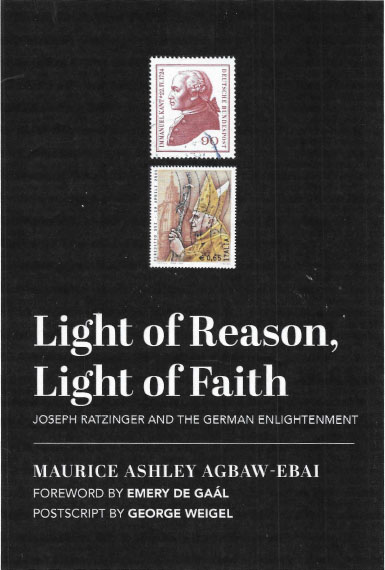Light of Reason, Light of Faith
By Father Maurice Ashley Agbaw-Ebai

Publisher’s Synopsis
Fr. Maurice Ashley Agbaw-Ebai, a native of Cameroon, has written a fresh, exciting new study of the lifelong engagement of Josef Ratzinger, later Pope Benedict XVI, with the German Enlightenment and its contemporary manifestations and heirs. Contemporary European disdain for organized religion and the rise in secularism on that continent has deep roots in the German Enlightenment. To understand contemporary Europe, one must return to this crucial epoch in its history, to those who shaped the European mind of this era, and to a study of the ideas they espoused and propagated. These ideas, for good or for ill, have taken hold in other parts of the modern world, being incarnated in many minds and institutions in contemporary society and threatening to enthrone a disfigured rationality without faith or a sense of Transcendence.
Ratzinger’s extraordinary and sympathetic understanding of the sources of contemporary secularism equipped him to appreciate the gains of the Enlightenment, while still being a fierce critic of the losses humanity has suffered when reason falsely excludes faith. Fr. Agbaw-Ebai’s account reveals Ratzinger, in relation to his various interlocutors, to be the truly “enlightened” one because he demonstrates a truly balanced understanding of the human mind. To be truly rational one must be able to hold to faith and reason, reason informed by faith in Jesus Christ.
Praise for Light of Reason
A journalist once joked to me that ‘Ratzinger would give his right leg for reason’ and he asked why reason is so important for him. This work by Fr Agbaw-Ebai is the definitive answer to that question.
Tracey Rowland, St John Paul II Chair of Theology, University of Notre Dame (Australia)
No Pope has ever spoken so frequently or fulsomely of the legacy of the Enlightenment as has Pope Benedict XVI. He repeatedly stressed the need for Christianty to welcome the real achievements of Enlightenment thought while insisting with equal vigor on the role of faith as a purifying force for reason. With this exploration of the influence of the Aufklarung on the Emeritus Pope’s lifelong preoccupation with faith and reason, Father Maurice Agbaw-Ebai makes a welcome contribution to Ratzinger studies.
Mary Ann Glendon, Professor of Law, Emeritus, Harvard University
A profound philosophical investigation of one of the key dialogs and dialectics of our time: between the Church (represented by a truly great pope, philosophers, and the “Enlightenment” that weaned most intellectuals away from her. Like Ratzinger himself, Father Ebai’s writing is dense and deep but well worth the effort required to engage it.
Peter Kreeft, Philosophy Department, Boston College